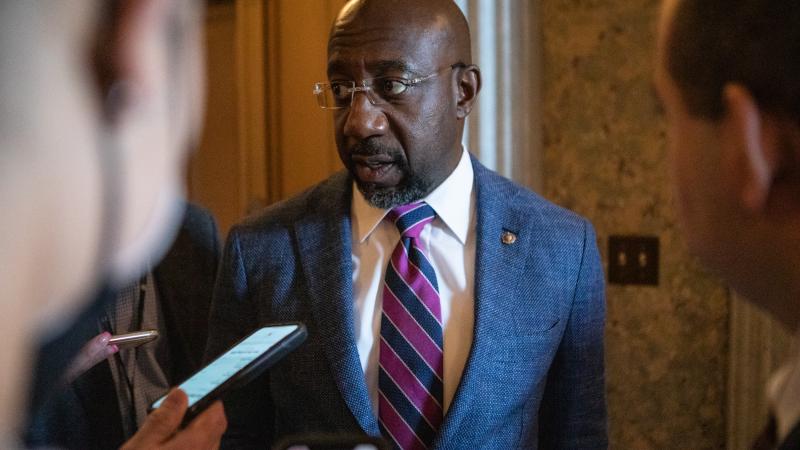Unequal justice? Republicans face censure, contempt prosecution, while Democrats skate
Many in GOP suspect their members are victims of a double standard that has let Democrats escape punishment for offenses of equal or greater gravity.
On Wednesday, the House voted largely along party lines, 223-207, to censure Rep. Paul Gosar (R-Arizona) for a roughly 90-second anime-style video posted to his Twitter account that featured a photoshopped, animated image of the congressman attacking an animated figure with the head of New York Democratic Rep. Alexandria Ocasio-Cortez.
The House vote stripped Gosar of his committee assignments on the Oversight and Natural Resources committees, effectively neutralizing his ability to influence legislation or oversight in Congress.
The censure of a member of the House is a rarely implemented punishment. The last time it had been used was in 2010, when Democratic Rep. Charles Rangel of New York was found guilty of multiple ethical violations, including tax evasion.
While Gosar's video has been condemned by fellow Republicans as inappropriate and in poor taste, many suspect he is the victim of a double standard that has let Democrats escape punishment for offenses of equal or greater gravity.
In June, for instance, a group of Republicans moved to censure several members of "The Squad," to no avail. Reps. Michael Waltz (Florida), Jim Banks (Indiana), and Claudia Tenney (New York) introduced a resolution to censure and condemn Democratic Reps. Ilhan Omar (Minnesota), Ayanna Pressley (Massachusetts), and Rashida Tlaib (Michigan), for "defending terrorist organizations and inciting anti-Semitic attacks across the United States."
The resolution cited several references by the lawmakers to Israel as an "apartheid state" and one occasion when Tlaib accused the Israeli government of "ethnic cleansing" against the Palestinians.
The resolution followed a flareup of fighting between Israel and Hamas and a statement by Omar in which she accused the U.S. and Israel of "unthinkable atrocities" that she equated with those perpetrated by Hamas and the Taliban.
Omar later clarified her position, but it was not the first time she had made a statement that rattled the Jewish community. The congresswoman's original statement was so poorly received that Speaker Pelosi was prompted to release a statement of her own, which said that "drawing false equivalencies" can foment "prejudice and undermine progress toward a future of peace and security for all." The speaker stopped short of specifically rebuking Omar, Pressley, or Tlaib.
Some Republican members blame the weakness of GOP leadership for the fate of Gosar. Georgia Rep. Marjorie Taylor Greene complains that Minority Leader Kevin McCarthy has failed to protect loyal members of his caucus, while failing to take action against the 13 House Republicans who broke party ranks to pass President Biden's $1.2 trillion infrastructure package.
Greene has seen "no willingness to fight for people like me ... no fight for Paul Gosar, who's getting censured here — and to lose his committee assignments," she told Just the News. Greene was herself stripped of her committee assignments just weeks after being sworn into office this year following the unearthing of controversial comments she posted online prior to her election.
In another case, Steve Bannon was indicted last week by the Department of Justice on two counts of contempt of Congress for refusing to comply with a subpoena issued by the House Select Committee investigating the Jan. 6 Capitol breach. On Monday, Bannon surrendered himself at FBI headquarters in Washington, D.C., promising to go on the offensive against the DOJ. On Wednesday, the 67-year-old pleaded not guilty.
It has been years since the DOJ opted to prosecute any individual held in contempt of Congress. The last successful conviction by the DOJ on contempt of Congress charges was in the Watergate era, when burglary defendant G. Gordon Liddy was convicted for refusing to answer questions before a House subcommittee.
More recent contempt of Congress votes have not resulted in any sort of action by the DOJ.
In 2012, the DOJ opted not to bring charges against then-Attorney General Eric Holder for failing to turn over documents related to the botched Fast and Furious "gunwalking" operation that resulted in violent Mexican cartels acquiring American weapons. In June of that year, the House voted to hold Holder in contempt by a margin of 255-67 (dozens of Democrats walked out of the vote). Just days day later, the DOJ formally announced it would not be prosecuting its top dog. Two years later, a federal judge also declined to find Holder in contempt of court.
Similarly, Lois Lerner, then-director of exempt organizations at the Internal Revenue Service, was held in contempt of Congress by a vote of 231-187 after she refused to comply with a subpoena from the Oversight and Government Reform Committee to testify about the IRS's targeting of conservative organizations for invasive scrutiny. The DOJ, again, ultimately declined to prosecute.
Former Utah congressman Jason Chaffetz says the main difference between the Holder and Lerner cases and the case of Steve Bannon is party alignment between Congress and the DOJ.
"This is a very compliant and politically aligned Department of Justice," said Chaffetz, now a Fox News commentator. During the later Obama years, by contrast, Congress was controlled by Republicans, while the DOJ aligned itself with the Obama White House.















